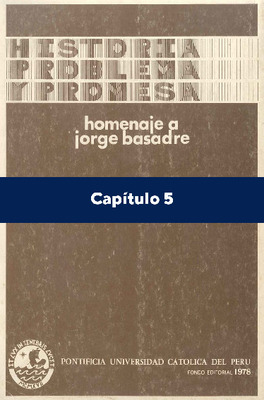| dc.contributor.author | Cook, Noble David | |
| dc.date.accessioned | 2023-04-25T15:20:03Z | |
| dc.date.available | 2023-04-25T15:20:03Z | |
| dc.date.issued | 1978 | |
| dc.identifier.uri | https://repositorio.pucp.edu.pe/index/handle/123456789/192690 | |
| dc.description | Volumen 1. Páginas 63-88 | |
| dc.description.abstract | The Independence movement in Peru was complicated by several factors which prolonged and confuse'd the struggle. F or example, after 1808 Peru became the military stronghold for the maintenance of Royal power in South America. The influx of vast numbers of military officers, born and educated in Spain, naturally tended to repress any revolutionary sentiments of the local population. Minar Indian uprisings were common in the eighteenth century and many léading Peruvians saw a possibility of another revolution on the scale of the Tupac Amaru rebellion of the 1780's. This fear whether real or imagined is illustrated by the Independence movement itself, for it certainly was not a social revolution beyond the overthrow of the dominant peninsulares. | es_ES |
| dc.language.iso | spa | es_ES |
| dc.publisher | Pontificia Universidad Católica del Perú. Fondo Editorial | es_ES |
| dc.rights | info:eu-repo/semantics/openAccess | es_ES |
| dc.rights.uri | http://creativecommons.org/licenses/by-nc-nd/2.5/pe/ | * |
| dc.source | Historia, problema y promesa : homenaje a Jorge Basadre | |
| dc.subject | Educación--Perú--Historia | es_ES |
| dc.subject | Liderazgo político--Perú--Historia | es_ES |
| dc.title | Education and the leaders of peruvian independence | es_ES |
| dc.type | info:eu-repo/semantics/bookPart | |
| dc.type.other | Capítulo de libro | |
| dc.subject.ocde | https://purl.org/pe-repo/ocde/ford#6.01.01 | |
| dc.publisher.country | PE | |
| dc.identifier.doi | https://doi.org/10.18800/F3415.3B3.005 | |


